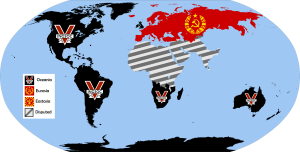Nut Jobs and Other Head Cases
by Fred Russell
Nowadays when people seem to be talking to themselves in the street, it usually turns out that they’re talking into their mobile phones, so it isn’t easy anymore to tell the crazies from the normals. You can say that all of us are a little crazy, for what makes people who talk to themselves sound crazy is not necessarily what they are saying but the fact that they are saying it out loud, because what they are saying is not very different from what most of us are thinking. All thoughts in the free and easy atmosphere of the mind – the stream of consciousness, the interior monologue, the declarations, the altercations, the interviews, the rants, the phrases and half-phrases, the fits and starts – are the stuff of madness. It is only by keeping them to ourselves that we don’t give ourselves away. If we spoke what we thought we would all be considered insane.
It isn’t very often that we get into people’s heads. Stream-of-consciousness writers generally miss the mark, even a James Joyce, for anyone reading him will realize that this is not really what the interior monologue sounds like at all. As a more authentic example, we have Robert Durst talking to himself in the bathroom at the end of The Jinx. This is what it sounds like:
There it is, you’re caught.
You’re right of course. But you can’t imagine. They want to talk to him. That’s good. I find them very frightening, and I do not want to talk to them. I don’t know. The washer.
Well, I don’t know what you expected to get. But … the rest of [unintelligible] I don’t know what’s in the house. Oh, I want this.
Killed them all, of course.
I want to do something new. There’s nothing new about that.
What a disaster. He was right. I was wrong. And the burping. I’m having difficulty with the questions. What the hell did I do?
[toilet flushes]
Of course the stream of consciousness in not entirely verbal. It incorporates images and feelings. These cannot be represented on the printed page so they are translated by writers into descriptive prose, as in “riverrun,” a short story by Fred Skolnik (Fomite Shorts, 2019) entering the mind of a madman:
snake in the toilet everything red blood and water piss and shit a fine kettle of fish and other things that i remember from my youth such as snapdragons and gingerbread cookies though i never had any they were too salty because my mother dipped them in seawater before setting the table there were three of us for a while but i wasn’t alone you and me both shut it mister before i break your teeth and all the other movable parts in your reproductive system and tear your kidneys out here they come fuck you fuck you can’t breathe so what neither can we had a most interesting discussion about that though i can’t remember a word she said i was so intent on seeing her panties when she crossed her legs and splitting her skull with an axe which i used to keep under my bed next to my erector set before i got one of my own and played with it under the blanket that’s a laugh i see pterodactyls in my future they came roaring overhead like fighter jets and we wondered what they were until we saw them tearing up the forests and realized we were in a prehistoric age and everyone lying on the ground struck down by a deadly virus except a few of us who started the human race and invented penicillin and talk shows but don’t take my word for it hey mister you can look it up in the world almanac under disasters with other interesting statistics punch and judy maisie lou and dipsy do you said it i think i will chug chug here it comes …
For the rest of us the interior monologue is milder but no less impulsive. Things come up when there is nothing to hold them back. The Freudian censor only works to protect us from what we do not wish to know. Otherwise, convention and common sense tells us when to keep our mouths shut, but there is no reason not to entertain the thoughts that pop up in our minds privately, though in the absence of a fully operative gatekeeper at the threshold of consciousness, as in sleep, we occasionally cut short unwelcome thoughts when we are fully conscious too. The mind is always working. One thing usually leads to another. We are not entirely in control but can usually stop the flow.
How do monkeys think then, since they don’t have the words? One can imagine images, feelings, urges and impulses, big or little pushes here or there. Ditto for cows, crows, codfish and maybe cockroaches too. It’s all of a piece, when you get right down to it – a percolating brain throwing out thoughts and images and feelings. This is who we are, until we act, and then it’s a whole new ballgame.






Be First to Comment